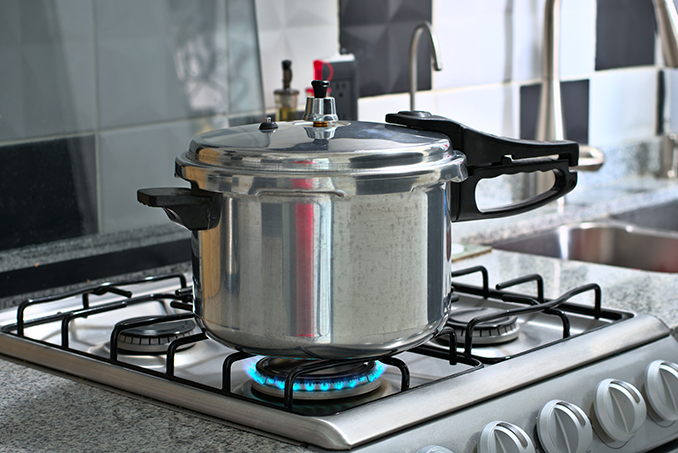If the past two years has taught us anything it is that home food preservation is on the rise in Randolph County. With all the work it takes to preserve garden foods, make sure you are off to a successful canning season and get your pressure canner gauge tested.
The main reason for testing; pressure canning is for low-acid foods. Low-acid foods include red meats, fish, poultry, and all vegetables, except for most tomatoes. Low-acid foods can support the production of the deadly botulism toxin if they are not processed properly in a pressure canner. A pressure canner needs to reach a temperature of 242° F or above to kill and destroy the spores that produce the botulism toxin. Clostridium botulinum bacteria are on most fresh food surfaces, but because they grow only in the absence of air, they are harmless on fresh foods. The conditions which favor the germination of these spores are low acid foods (like vegetables and meats) in anaerobic environments (without oxygen), such as sealed canning jars. Clostridium botulinum is a very deadly toxin or poison, commonly known as botulism. Botulism is the most-deadly food poisoning.
Home-canned vegetables are the most common cause of botulism outbreaks in the United States. These outbreaks often occur because home canners did not follow canning instructions, did not use pressure canners, ignored signs of food spoilage, or were unaware of the risk of botulism from improperly preserving vegetables. https://www.cdc.gov/features/homecanning/. Only use current with up-to-date, scientifically tested guidelines like the USDA National Center for Home Food Preservation, http://nchfp.uga.edu/publications/publications_usda.html. Don’t use outdated publications or cookbooks, even if they were handed down to you from trusted family cooks.
There are two types of pressure canners; dial gauge and weighted gauge. Weighted pressure canners release any pressure above the desired amount of pressure and the weight will rock gently and make frequent jiggling noise to indicate the correct pressure is maintained. Reference the manufacturer’s instructions to use a particular weighted gauge properly. Weighted gauges do not require testing. Dial gauges operate by indicating pounds of pressure on the dial while you control the pressure using the stove burner knob to adjust the heat up and down. Dial gauges require annual testing for accuracy
By testing your dial gauge annually, you know if the canner will process high or low. If a dial gauge reads low, it can result in under-processing resulting in unsafe food. At high, the food will be over-processed, which affects quality. Pressure adjustments can be made if the gauge reads up to 2 pounds high or low. With a difference of more than 2 pounds, gauge replacement is required. In addition, replace gauges that are cracked or the glass covering is missing. Only annual testing will determine if a gauge is safe to use.
How do you test your gauge?
Check with the Randolph County Center of the NC Cooperative Extension. We offer free pressure canner testing clinics on certain scheduled dates or you can drop off just your lid and we can test it as our schedule allows and call you when it is ready to be picked up. For more information, call 336-318-6000.
Jeannie M. Leonard is Family & Consumer Sciences Extension Agent with the N.C. State Cooperative Extension Service.

